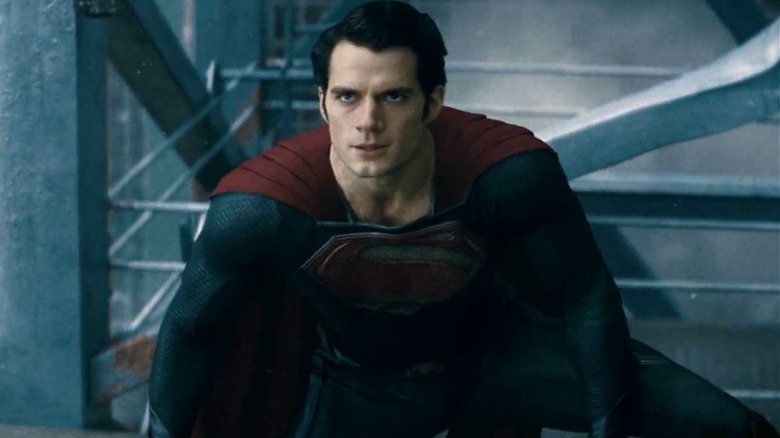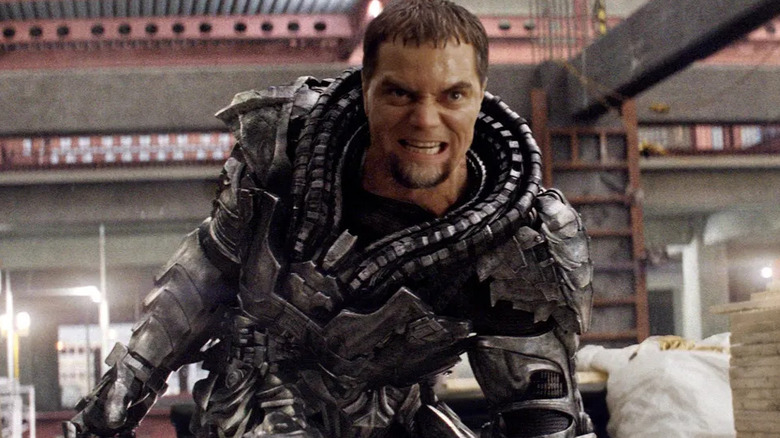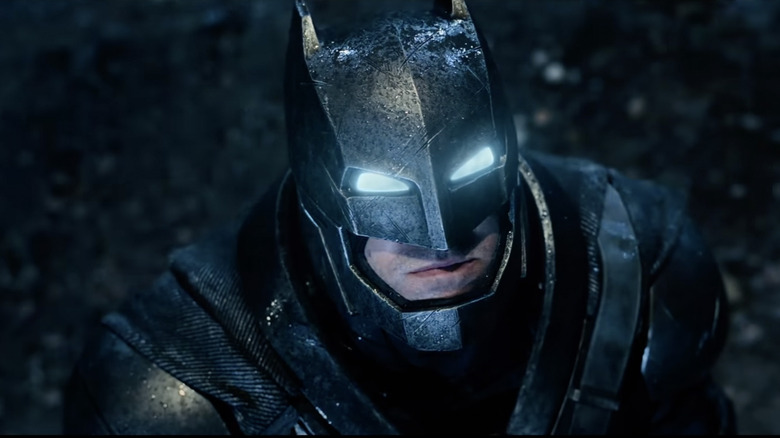Man Of Steel Artist Defends One Of Zack Snyder's Most Controversial Scenes
A frequent Zack Snyder collaborator is defending one of the director's more controversial creative choices in "Man of Steel."
In 2013, Warner Bros. tapped "300" director Zack Snyder to deliver the first film in what would become the DC Extended Universe: "Man of Steel." A gloomy and subtext-heavy origin Superman origin story, the film was a mild success for the studio and served as the foundation for its planned franchise. But the film wasn't without controversy — following its release, critics and audiences lambasted Snyder for showcasing Superman (Henry Cavill) and General Zod's (Michael Shannon) wanton and reckless destruction of Metropolis, which failed to match up with the hero's famous ethos to minimize chaos and save as many lives as possible.
Years later, people continue to discuss Snyder's choice to destroy Metropolis and to showcase Superman as a rash, impulsive hero with no sense of self-awareness. On X (formerly known as Twitter), fans have debated the sequence in which Superman leaps over a gasoline-filled truck, letting it explode in a parking garage, instead of simply stopping it, reducing the potential amount of destruction.
Jay Oliva, a longtime Snyder collaborator and one of the storyboard artists for "Man of Steel," chimed in on the platform to defend Superman's choice. "I came up with that scene and had no bystanders anywhere shown and used an empty parking lot for said destruction," Oliva said. "If you want to believe that there's people in there then that's on you but not what's in the film or what was intended," Olva added, pointing out how a lot of the criticism that Snyder's "destruction" receives isn't particularly warranted.
Jay Oliva shares who could have saved bystanders
Besides working with Zack Snyder on "Man of Steel" and "Batman v Superman: Dawn of Justice," Jay Oliva has directed a number of DC animated films, including "Justice League: The Flashpoint Paradox" and "Justice League Dark." As one of DC's most consistent creatives, and one of Snyder's most prominent collaborators, fans should digest his take as one of authority when he defends the sequence he helped bring to life. Oliva continued his response on X by suggesting a scenario that would have seen bystanders saved (if there were any to begin with). "But I can also say that whatever bystander was in danger the flash came in and whisked them away to safety throughout the destruction of metropolis," Oliva said, adding that Doctor Fate or any other DC hero would have also helped.
Over a decade after the release of "Man of Steel," fans still debate Superman's actions and the resulting destruction, and maybe they're not wrong. Scientist and disaster expert Charles Watson worked with Buzzfeed following the film's release to deduce just how much the damage to the city would have cost, estimating the initial repairs at $700 billion. Watson also estimates that 129,000 known people would have been killed during the attacks, with nearly a million people injured.
While Oliva is fair to defend that one sequence, it doesn't undermine the fact that Superman is partially responsible for the destruction of Metropolis. The silver lining here, however, is how Snyder tied Superman's destruction into the film's sequel, "Batman v Superman: Dawn of Justice."
Man of Steel's destruction laid the foundation for Snyder's DCEU
Following the release of "Man of Steel," Zack Snyder defended the film's final battle, saying it was important for Superman to deal with the consequences of his actions. "I was surprised because that's the thesis of Superman for me, that you can't just have superheroes knock around and have there be no consequences," the director told Entertainment Weekly. The director weaved this sentiment into "Batman v Superman: Dawn of Justice," which features Batman (Ben Affleck) hunting down Superman because of the destruction he was responsible for.
While this decision continues to remain controversial, it's interesting how Snyder was invested in having the "Man of Steel" sequel examine just how reckless Superman was. This idea of having Batman appear as vengeful (and upset at Superman's deification) appealed to Affleck as well, who told EW that he enjoyed Snyder's "idea of showing accountability and the consequences of violence and seeing that there are real people in those buildings."
Despite the very foundation of the DCEU being based on acknowledging Superman's destruction, it's worth noting how some fans still continue to see it as an oversight. After all, "Batman v Superman" is literally born out of the idea that the Man of Steel isn't perfect and that he has to deal with the consequences of his actions, no matter how powerful he is. Ultimately, "Man of Steel" continues to be one of the most controversial superhero films of all time, thanks in part to how it shows Superman's failures as a hero — a creative choice that just doesn't appeal to everyone.


